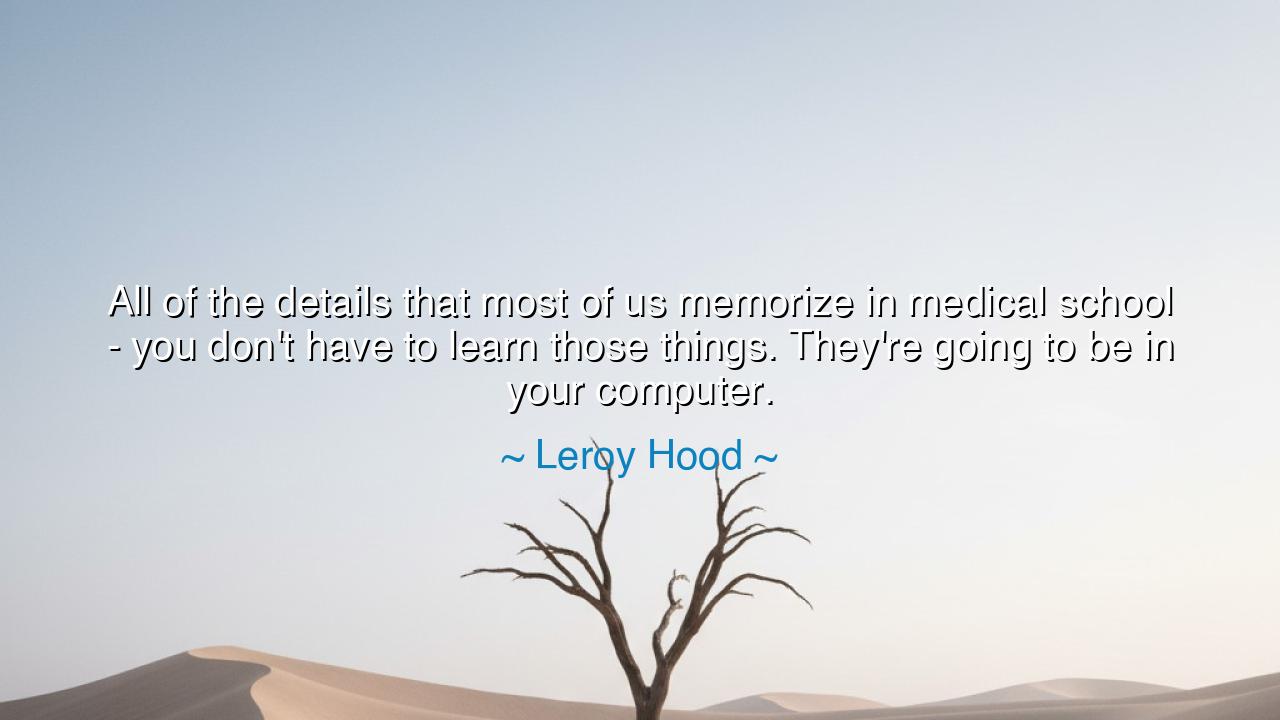
All of the details that most of us memorize in medical school -
All of the details that most of us memorize in medical school - you don't have to learn those things. They're going to be in your computer.






When Leroy Hood declared, “All of the details that most of us memorize in medical school — you don’t have to learn those things. They’re going to be in your computer,” he spoke as one who had seen the rising tide of a new age. His words are not meant to belittle knowledge, but to shift the gaze of the student from rote memory to higher wisdom. For he proclaims that the essence of mastery is not in the memorization of countless facts, but in the understanding of principles, the wielding of tools, and the vision to unite knowledge into action.
The meaning of his words lies in the distinction between details and wisdom. The ancients filled scrolls and tablets with endless lists of herbs, bones, and stars, yet the true master was not the one who recited them without error, but the one who understood how to apply them in the hour of need. Hood, a pioneer of systems biology, reminds us that in an age where the computer can store and recall infinite knowledge, the mind of the physician and the scientist must be free for higher pursuits — for synthesis, for imagination, for compassion. Facts alone no longer define greatness; wisdom in their use does.
The origin of such a declaration rests in Hood’s own life, for he lived at the crossroads of medicine, technology, and biology. He helped invent the automated DNA sequencer, unlocking the code of life itself. He saw firsthand that no human mind could hold the torrents of genetic data flooding forth; only the partnership with machines could make sense of it. Thus, when he speaks of freeing students from memorizing medical school minutiae, he speaks as one who knows the vastness of modern knowledge — and the futility of grasping it all without aid.
History offers parallels. When the abacus gave way to written numerals, and later to mechanical calculators, some feared the loss of discipline, yet what was truly gained was freedom: the freedom for mathematicians to pursue deeper theorems, for merchants to pursue greater trade. When sailors moved from memorizing stars to reading sextants and charts, they did not abandon the heavens but used new tools to voyage further. So too, Hood calls the physician of tomorrow to rise above mere memorization, using the computer as sextant, and venturing into the uncharted seas of discovery.
Yet his words carry a warning as well. To depend on tools without understanding is to walk blindly, like a child with a weapon. If one leans wholly upon the computer, forgetting the principles behind the data, then one risks error when the machine falters. Thus, the wise must not abandon learning altogether, but must distinguish between what must be carried in the mind — compassion, judgment, first principles — and what may be trusted to faithful instruments. The challenge of the future is balance: neither clinging to rote memorization nor surrendering entirely to the machine.
The lesson for us is timeless: use tools to liberate the mind, not to weaken it. The computer is a servant, not a master. Let it hold the vast storehouse of knowledge, but let your mind remain sharp in wisdom, capable of discernment, alive with imagination. Just as the physician must know not only which drug to prescribe, but why and when to prescribe it, so too must each of us carry within us not just facts, but the spirit of understanding.
Practical actions arise from this teaching. In your studies, do not burden yourself with endless rote details at the expense of understanding. Focus instead on the principles that endure. In your work, embrace the tools that technology provides, but always question, always interpret, always ensure that your humanity remains at the center. And in your life, remember that knowledge is not diminished by storing it outside the mind, but is elevated when freed to serve wisdom.
Thus, Hood’s words stand as a beacon to future generations: facts may dwell in the computer, but wisdom must dwell in the soul. May we, like the seekers of old, learn to wield our tools with reverence, using them not to shrink our minds, but to expand our vision, so that we may walk boldly into the vast and uncharted fields of tomorrow.






AAdministratorAdministrator
Welcome, honored guests. Please leave a comment, we will respond soon